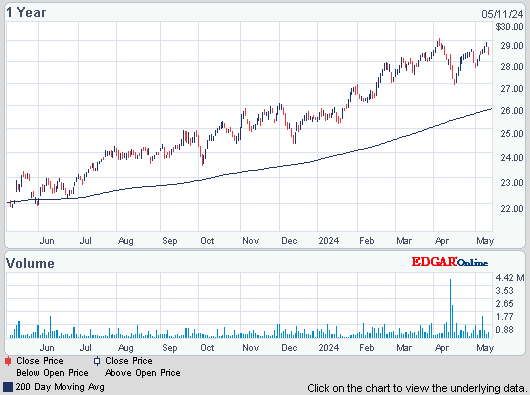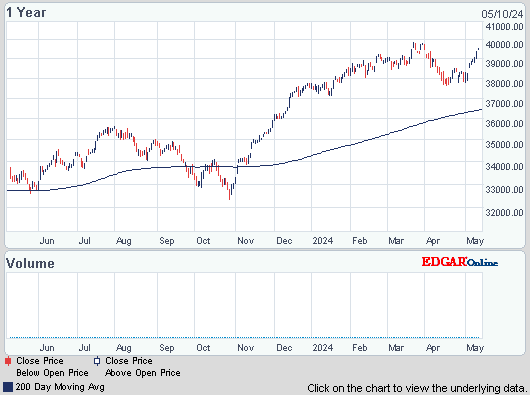Dow lost 23, advancers over decliners 2-1 & NAZ climbed 28. The MLP index was up a fraction to the 467s & the REIT index rose 1+ to the 282s (not seen since the start of Nov). Junk bond funds were mixed & Treasuries gained. Oil rose
above $102 a barrel, the highest level in 4 months, on
speculation that inventories in Cushing, OK (major oil hub), decreased
last week & as cold weather in the US boosted fuel demand. Gold continues on its winning ways as it has been doing this year.
AMJ (Alerian MLP Index tracking fund)

![Live 24 hours gold chart [Kitco Inc.]](http://www.kitco.com/images/live/gold.gif)

Photo: Bloomberg
US consumer debt rose in Q4 by the most in more than 6 years as Americans borrowed to buy homes & cars & to pay for education, according to a report by the Federal Reserve Bank of New York. Household debt increased 2.1% ($241B) to $11.5T, the biggest gain since Q3 2007 (just prior to the recession). The level of debt was $180B higher than a year earlier. “After a long period of deleveraging, households are borrowing again,” the New York Fed said. Total indebtedness remains 9.1% below the peak of $12.6T in Q3-2008. Consumers have been cleaning up their balance sheets in the aftermath of the worst recession since ind decades. Household spending that rose at the fastest pace in 3 years helped the economy grow at a 3.2% rate in Q4. Mortgage balances led the rise in consumer borrowing, increasing 1.9% ($152B), to $8.1T. Foreclosures are at the lowest levels since the end of 2005. Auto debt expanded $18B to $863B & credit-card borrowing climbed $11B to $683B. Delinquency rates continued to drop, with 7.1% of outstanding debt in some stage of delinquency, down from 7.4% in Q3. There were about 332K new bankruptcies during Q4, little changed from a year earlier. From Q4-2012 to the end of last year, student-loan debt swelled the most in dollar terms, increasing $114B to $1.1T. In Q4, education borrowing rose $53B.
A measure of capital flowing in & out of the US showed the biggest net selling since Feb 2009 (depth of the recession) as the Federal Reserve prepared to scale back its bond buying, according to Treasury Dept. Investors sold a net $15.4B of long-term agency debt in Dec, the biggest monthly drop in those securities since Sep 2010 amid selling in Caribbean banking centers often used by hedge funds. They also sold US stocks & corp bonds, while China & Japan reduced holdings of Treasuries in the month the Fed decided to trim monthly asset purchases to $75B from $85B. Total cross-border outflow in Dec, including short-term securities such as Treasury bills & stock swaps, was $119B, after a revised outflow of $13B in Nov. Foreign net sales of long-term securities totaled $46B, after selling of $28B in Nov. China reduced its holdings of Treasuries by $48B, or 3.6%, to $1.27T in Dec from a record the previous month. Japan’s holdings of Treasuries dropped $3.9B to $1.18T.
U.S. Cross-Border Outflow of Capital Hits Highest Since 2009
China's central bank sold repurchase contracts for the first time since Jun, draining funds from the banking system as money-market rates sink to the lowest levels in at least 3 months. The People’s Bank of China (PBOC) conducted 48B yuan ($7.9B) of 14 day repurchase contracts (repos) at 3.8% today. The monetary authority last issued such contracts on Jun 6, when it sold 10B yuan of 28 day repos. Today’s rate is higher than both the 2.75% in the Jun auction & the 2.05% when the PBOC last issued 14 day repos in Jan 2011. The 7 day repurchase rate, a gauge of funding availability in the banking system, fell 8 basis points to 3.76% today after touching 3.71%, the lowest since Nov. The overnight rate dropped as much as 24 basis points to 2.63%, the lowest since May. One-year interest rate swaps based on the floating 7 day repo rate were unchanged at 4.84%, after climbing as much as 4 basis points. There has been a lot going on in the Chinese financial markets.
PBOC Drains Funds Using Repos for First Time in Eight Months
Little was done today in the markets. But we got a first indication that bad weather in the US is hurting the economy. The overseas markets are giving mixed messages. There is unrest in the MidEast & now Ukraine is unsettled. Europe has ended its recession, but recovery has been only spotty. China is in relative troubled waters with a sub-standard growth rate. Now forecasts for US growth will have to be revised lower. These thoughts give a rationale behind the market's stalling out in the last couple of days. Dow remains underwater YTD, down 445.
Dow Jones Industrials

AMJ (Alerian MLP Index tracking fund)
Treasury yields:
U.S. 3-month |
0.02% | |
U.S. 2-year |
0.30% | |
U.S. 10-year |
2.71% |
| CLH14.NYM | ....Crude Oil Mar 14 | ....102.26 | (1.0%) |
![Live 24 hours gold chart [Kitco Inc.]](http://www.kitco.com/images/live/gold.gif)

US consumer debt rose in Q4 by the most in more than 6 years as Americans borrowed to buy homes & cars & to pay for education, according to a report by the Federal Reserve Bank of New York. Household debt increased 2.1% ($241B) to $11.5T, the biggest gain since Q3 2007 (just prior to the recession). The level of debt was $180B higher than a year earlier. “After a long period of deleveraging, households are borrowing again,” the New York Fed said. Total indebtedness remains 9.1% below the peak of $12.6T in Q3-2008. Consumers have been cleaning up their balance sheets in the aftermath of the worst recession since ind decades. Household spending that rose at the fastest pace in 3 years helped the economy grow at a 3.2% rate in Q4. Mortgage balances led the rise in consumer borrowing, increasing 1.9% ($152B), to $8.1T. Foreclosures are at the lowest levels since the end of 2005. Auto debt expanded $18B to $863B & credit-card borrowing climbed $11B to $683B. Delinquency rates continued to drop, with 7.1% of outstanding debt in some stage of delinquency, down from 7.4% in Q3. There were about 332K new bankruptcies during Q4, little changed from a year earlier. From Q4-2012 to the end of last year, student-loan debt swelled the most in dollar terms, increasing $114B to $1.1T. In Q4, education borrowing rose $53B.
A measure of capital flowing in & out of the US showed the biggest net selling since Feb 2009 (depth of the recession) as the Federal Reserve prepared to scale back its bond buying, according to Treasury Dept. Investors sold a net $15.4B of long-term agency debt in Dec, the biggest monthly drop in those securities since Sep 2010 amid selling in Caribbean banking centers often used by hedge funds. They also sold US stocks & corp bonds, while China & Japan reduced holdings of Treasuries in the month the Fed decided to trim monthly asset purchases to $75B from $85B. Total cross-border outflow in Dec, including short-term securities such as Treasury bills & stock swaps, was $119B, after a revised outflow of $13B in Nov. Foreign net sales of long-term securities totaled $46B, after selling of $28B in Nov. China reduced its holdings of Treasuries by $48B, or 3.6%, to $1.27T in Dec from a record the previous month. Japan’s holdings of Treasuries dropped $3.9B to $1.18T.
U.S. Cross-Border Outflow of Capital Hits Highest Since 2009
China's central bank sold repurchase contracts for the first time since Jun, draining funds from the banking system as money-market rates sink to the lowest levels in at least 3 months. The People’s Bank of China (PBOC) conducted 48B yuan ($7.9B) of 14 day repurchase contracts (repos) at 3.8% today. The monetary authority last issued such contracts on Jun 6, when it sold 10B yuan of 28 day repos. Today’s rate is higher than both the 2.75% in the Jun auction & the 2.05% when the PBOC last issued 14 day repos in Jan 2011. The 7 day repurchase rate, a gauge of funding availability in the banking system, fell 8 basis points to 3.76% today after touching 3.71%, the lowest since Nov. The overnight rate dropped as much as 24 basis points to 2.63%, the lowest since May. One-year interest rate swaps based on the floating 7 day repo rate were unchanged at 4.84%, after climbing as much as 4 basis points. There has been a lot going on in the Chinese financial markets.
PBOC Drains Funds Using Repos for First Time in Eight Months
Little was done today in the markets. But we got a first indication that bad weather in the US is hurting the economy. The overseas markets are giving mixed messages. There is unrest in the MidEast & now Ukraine is unsettled. Europe has ended its recession, but recovery has been only spotty. China is in relative troubled waters with a sub-standard growth rate. Now forecasts for US growth will have to be revised lower. These thoughts give a rationale behind the market's stalling out in the last couple of days. Dow remains underwater YTD, down 445.
Dow Jones Industrials
I’m a huge fan of INO & from what I have seen so far, their service Marketclub! This isn’t a stripped down version, everything in MarketClub is available to you. I don’t want to give everything away, but you’ll have unlimited access to my favorite 3 tools: Trade Triangles, Smart Scan & Alerts!
The best part is that the MarketClub customer support team will be providing UNLIMITED support!
You can call or email for an instant response to any question, comment or concern.
Here’s that link:
https://club.ino.com/join/specialtrial/index_free.html?a_aid=CD3289&a_bid=359ef9a3
I’d recommend you jump on this now.









No comments:
Post a Comment